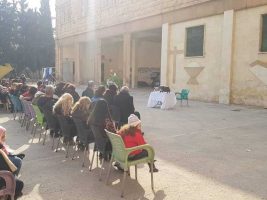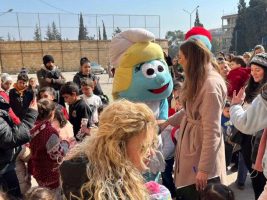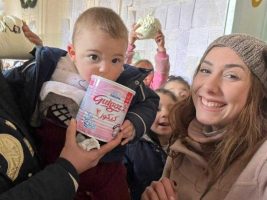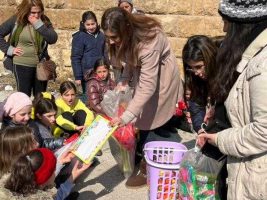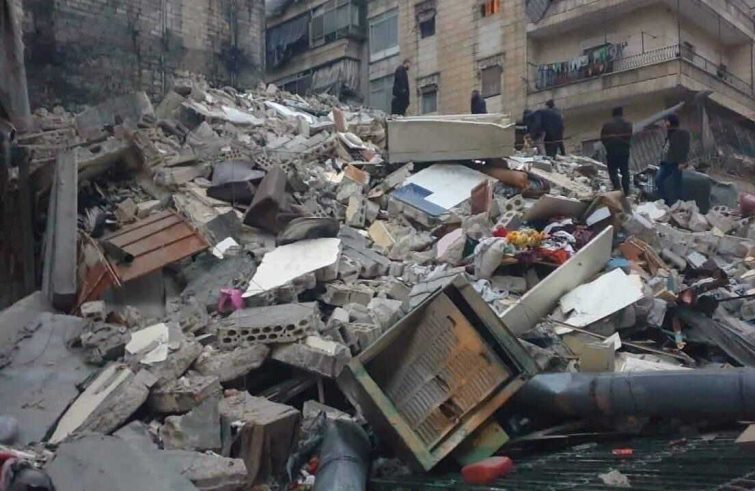
“It’s an increasingly tragic situation. Devastating levels of destruction appear before our eyes as the days go by: houses, buildings, offices ripped apart. The tremors continue and, although less severe, they rattle the buildings that are still standing, increasing the risk of collapse. The earthquake destroyed most of Aleppo. It was not destroyed by 12 years of war and six years of siege, but by a tremendous one-minute long earthquake”, reports to SIR Elia Kajmini, theatre director, playwright, head of the “Art and Psychology” Centre inside the Terra Sancta College in Aleppo, where he took refuge with his wife and daughter after the earthquake of February 6. Elia is volunteering assistance to the victims together with Father Samhar Ishak, director of the Terra Sancta College that is currently providing shelter to over 1,500 earthquake victims. They were 2,500 the day after the quake. The death toll has risen to 40,000 with thousands of people still missing, and the figures keep rising by the hour. Rescuers keep digging through the rubble in the hope of finding survivors. And indeed they were found, for example, in Antakya, Turkey, where two brothers aged 8 and 15 were pulled out alive 181 hours after the earthquake. Two lives were saved in Kahramanmaras (Turkey), where a woman and a 17-year-old boy were rescued this morning, eight days after the earthquake. True miracles. With regard to the aid for Syria, the situation is expected to improve now that Syrian President Bashar al-Assad has decided to open the two border crossing points of Bab Al-Salam and Al Ra’ee to allow the swift delivery of humanitarian aid. “Opening these crossing points – along with facilitating humanitarian access, accelerating visa approvals and easing travel between hubs – will allow more aid to go in, faster”, said UN Secretary General Antonio Guterres.
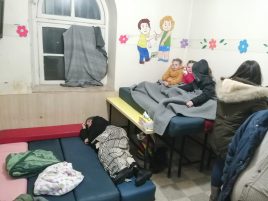 Despair prevails among Aleppo’s earthquake survivors. “We receive news of people killed, hospitalised, traumatised, missing, with each passing day. It is a long list of friends, acquaintances, relatives, that is tragically being updated. The population is discouraged, frustrated, disappointed. Most Aleppo residents are overwhelmed by feelings of abandonment”, he explains. “The arrival of first aid convoys in the city was not enough to bring back some hope, and neither was the visit of a WHO delegation. We held a party for the children here at our centre on Sunday, February 12, with a puppet theatre and small gifts, so as to bring a smile to their faces and lighten the mood of their families.
Despair prevails among Aleppo’s earthquake survivors. “We receive news of people killed, hospitalised, traumatised, missing, with each passing day. It is a long list of friends, acquaintances, relatives, that is tragically being updated. The population is discouraged, frustrated, disappointed. Most Aleppo residents are overwhelmed by feelings of abandonment”, he explains. “The arrival of first aid convoys in the city was not enough to bring back some hope, and neither was the visit of a WHO delegation. We held a party for the children here at our centre on Sunday, February 12, with a puppet theatre and small gifts, so as to bring a smile to their faces and lighten the mood of their families.
- Aleppo, Terra Sancta College (Foto E. Kajmini)
- Aleppo, Terra Sancta College (Foto E. Kajmini)
- Aleppo, Terra Sancta College (Foto E. Kajmini)
- Aleppo, Terra Sancta College (Foto E. Kajmini)
The days at Terra Sancta College pass slowly, revolving around meal times: “three meals a day, breakfast, lunch – cooked in the large dining hall of the Latin parish and brought by van to the College – and dinner. Bread, cheese, rice, hummus, a little bit of vegetables, is all there is. Providing food for 2000 people in these conditions is a challenge. Mattresses, blankets, hygiene kits and medicines were delivered through Caritas Syria and other humanitarian agencies. The US easing of sanctions seems to have facilitated the arrival of aids. Let us hope that this will continue”, says Elia. Heavily loaded trucks can be heard outside the big gates of the college, digging and demolishing houses that have been declared uninhabitable because they are unsafe. “The owners had just enough time to take what they could and then the bulldozers knocked them down. People whose homes are in good condition are not planning to return because they are afraid. The power outage adds to the daily difficulties, with fear taking its toll.” “We are all aware that hard times lie ahead,” Elia concludes. “We know what is in store for us, but we don’t know what to do without help.”
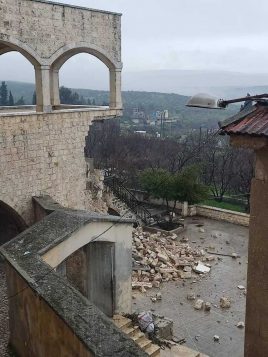 Eighty per cent of all residential buildings in Knaye collapsed. Not even the small Christian community living in the three Christian majority villages in the Orontes Valley, Knaye, Yacoubieh and Gidaideh, in the Governorate of Idlib, a stronghold of rebels fighting President Assad’s regime, is aware of this. Father Hanna Jallouf, the parish priest of Knaye, is currently in Damascus and he cannot return to his parish, which is only 50 km from Idlib. He has been constantly in touch with his confrere Father Luai Bsharat since February 6. A few hours after the quake, the latter described the situation in the Christian villages to the NGO Pro Terra Sancta: “The Lord saved me from a certain death – he said – My church and most of the monastery are completely destroyed. We spend a lot of time visiting and helping people. Most houses are damaged. We thank the Lord for saving our lives, but many of our neighbours have died, although we still don’t have the exact numbers. Aids are slow in coming and communication lines are often down,” he says. “Father Luai is doing fine, trying to do all he can to be close to the people affected by the earthquake,” Father Hanna confirmed to SIR. “He visits our faithful sheltered in reception centres and tent camps. Eighty per cent of residential buildings in Knaye have collapsed. He is currently preparing an inventory of the damages to churches and church structures. His church in Yacoubieh remains inaccessible for religious services, the same in Knaye. Here, with the help of some believers, he moved the pews, cleaned the church and fixed the roof of the church.”
Eighty per cent of all residential buildings in Knaye collapsed. Not even the small Christian community living in the three Christian majority villages in the Orontes Valley, Knaye, Yacoubieh and Gidaideh, in the Governorate of Idlib, a stronghold of rebels fighting President Assad’s regime, is aware of this. Father Hanna Jallouf, the parish priest of Knaye, is currently in Damascus and he cannot return to his parish, which is only 50 km from Idlib. He has been constantly in touch with his confrere Father Luai Bsharat since February 6. A few hours after the quake, the latter described the situation in the Christian villages to the NGO Pro Terra Sancta: “The Lord saved me from a certain death – he said – My church and most of the monastery are completely destroyed. We spend a lot of time visiting and helping people. Most houses are damaged. We thank the Lord for saving our lives, but many of our neighbours have died, although we still don’t have the exact numbers. Aids are slow in coming and communication lines are often down,” he says. “Father Luai is doing fine, trying to do all he can to be close to the people affected by the earthquake,” Father Hanna confirmed to SIR. “He visits our faithful sheltered in reception centres and tent camps. Eighty per cent of residential buildings in Knaye have collapsed. He is currently preparing an inventory of the damages to churches and church structures. His church in Yacoubieh remains inaccessible for religious services, the same in Knaye. Here, with the help of some believers, he moved the pews, cleaned the church and fixed the roof of the church.”
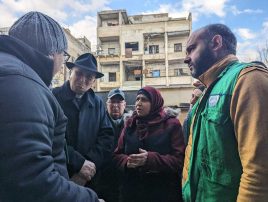 Delays in aid relief efforts are pushing many families to leave Aleppo and Latakia, the most damaged cities, and head towards Damascus. “Large numbers of people are pouring into Damascus – confirms the Franciscan priest – which is why we are now opening the doors of convents across the city. Last Sunday, Cardinal Mario Zenari, apostolic nuncio in Syria, came to bring his solidarity and that of Pope Francis to the families who arrived from Aleppo.”
Delays in aid relief efforts are pushing many families to leave Aleppo and Latakia, the most damaged cities, and head towards Damascus. “Large numbers of people are pouring into Damascus – confirms the Franciscan priest – which is why we are now opening the doors of convents across the city. Last Sunday, Cardinal Mario Zenari, apostolic nuncio in Syria, came to bring his solidarity and that of Pope Francis to the families who arrived from Aleppo.”
The message of the OFM General Minister. The friars in Syria likewise received the solidarity and closeness of the Order’s General Minister, Father Massimo Fusarelli, currently in Colombia.
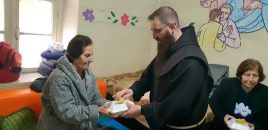 “Dear brothers in Syria, I express my closeness to you and your people in this tragedy of sorrow and death. I am well aware – reads the message received by SIR – that our presence and the help you are offering are a powerful sign, in keeping with the traditional spirit of the friars of the Holy Land over the centuries. I am following the developments and the aids we are collecting as a Religious Order. I offer my fraternal embrace, looking forward to seeing you in your sorely wounded land. May peace and goodness be upon you with the blessing of St Francis. My thoughts go also to all the brothers who are there, one by one.”
“Dear brothers in Syria, I express my closeness to you and your people in this tragedy of sorrow and death. I am well aware – reads the message received by SIR – that our presence and the help you are offering are a powerful sign, in keeping with the traditional spirit of the friars of the Holy Land over the centuries. I am following the developments and the aids we are collecting as a Religious Order. I offer my fraternal embrace, looking forward to seeing you in your sorely wounded land. May peace and goodness be upon you with the blessing of St Francis. My thoughts go also to all the brothers who are there, one by one.”

